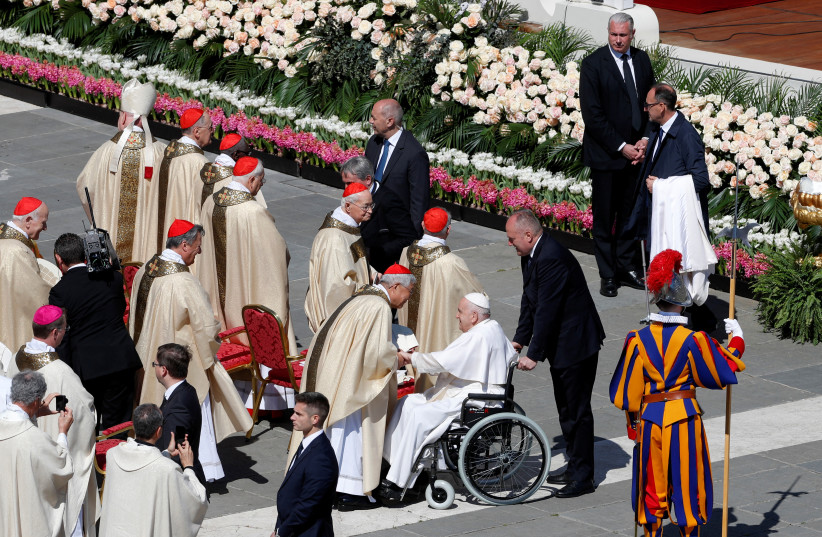Pope Francis appealed for dialogue between Israelis and Palestinians following recent violence in his Easter address Sunday morning, also asking Russians to seek the truth about their country's invasion of Ukraine.
Francis, 86, presided at a solemn Easter day Mass in a sunny St. Peter's Square after unseasonal cold forced him to skip an outdoor service on Friday - a precaution following his hospitalization for bronchitis at the end of March.
A carpet of 38,000 flowers donated by the Netherlands bedecked the square for the most important and joyous date in the Church's liturgical calendar - commemorating the day Christians believe Jesus rose from the dead. Honor units of Vatican Swiss Guards and Italian Carabinieri police - both in ceremonial dress - stood at attention.
But the traditional pomp and sacred singing then gave way to modern realities. Francis later went up to the central balcony of St. Peter's Basilica to deliver his twice-yearly "Urbi et Orbi" (to the city and the world) message and blessing, addressing a crowd the Vatican estimated at about 100,000.

There, from the same spot where he first appeared to the world as pope on the night of his election in 2013, he spoke of "the darkness and the gloom in which, all too often, our world finds itself enveloped," and prayed to God for peace.
"Help the beloved Ukrainian people on their journey towards peace, and shed the light of Easter upon the people of Russia," he said.
Since Russia invaded Ukraine in February last year, Francis has at least twice a week referred to Ukraine and its people as being "martyred" and has used words such as aggression and atrocities to describe Russia's actions.
On Sunday he asked God to "comfort the wounded and all those who have lost loved ones because of the war, and grant that prisoners may return safe and sound to their families. Open the hearts of the entire international community to strive to end this war and all conflict and bloodshed in our world."
As he has done every Easter, Francis called for peace in the Middle East, his appeal made more urgent by recent violence in Jerusalem and cross-border exchanges of fire involving Israel, Lebanon, and Syria.
"On this day, Lord, we entrust to you the city of Jerusalem, the first witness of your resurrection. I express deep worry over the attacks of these last few days that threaten the hoped-for climate of trust and reciprocal respect, needed to resume the dialog between Israelis and Palestinians, so that peace may reign in the Holy City and in the entire region," he said.
Israeli-Palestinian tensions have sharply increased since Israeli police raids last week on Al-Aqsa mosque in Jerusalem, which caused outrage across the Arab world.
Troubled places
Between the Mass and his reading of the message, Francis, appearing in fine form, was driven in a popemobile around the square and down the main boulevard leading to the River Tiber so more people could see him.
In his message, Francis also mentioned instability in Lebanon, expressed the hope that the "martyred Rohingya people" of Myanmar "may encounter justice," and called for more aid for the victims of earthquakes in February that killed nearly 56,000 people in Turkey and Syria.
In a section of the address where he mentioned Nicaragua, the pope asked God to "remember all who are prevented from freely and publicly professing their faith."
Relations between the government and Catholic Church in Nicaragua are deeply strained. The government, which has suspended diplomatic relations with the Vatican, banned outdoor Holy Week processions this year.
Ukraine's response to the Pope's message
Ukraine's Foreign Ministry Spokesman Oleg Nikolenko took to Facebook to express his disappointment in the Pope's comments.
Nikolenko wrote that the comments "attempt to equate the victim and the aggressor" and that he is "disappointed that the Holy Throne did not take into account the arguments of the Ukrainian side about the offensive nature of such a gesture."
"The joint participation of a Ukrainian and a Russian distorts the reality in which Russia plunged Ukrainians, embodimenting genocide against them."
Nikolenko also argued that the comments undermine "the principles of justice and common human morality, discredits the concept of peace and brotherhood."
"Attempts to mark equality between suffering Ukraine and suffering Russia are not conducive to reconciliation. Reconciliation can only come after the Ukrainian victory, the punishment of all Russian criminals, repentance for the suffering caused and asking for forgiveness to the Ukrainians."
Attempts to mark equality between suffering Ukraine and suffering Russia are not conducive to reconciliation. Reconciliation can only come after the Ukrainian victory, the punishment of all Russian criminals, repentance for the suffering caused and asking for forgiveness to the Ukrainians.
Oleg Nikolenko, a spokesperson for Kyivs foreign ministry
He added that Ukraine expects "at the Holy Throne will continue to follow an approach based on a deep understanding of justice and responsibility for restoring peace in Ukraine and the establishment of justice."
